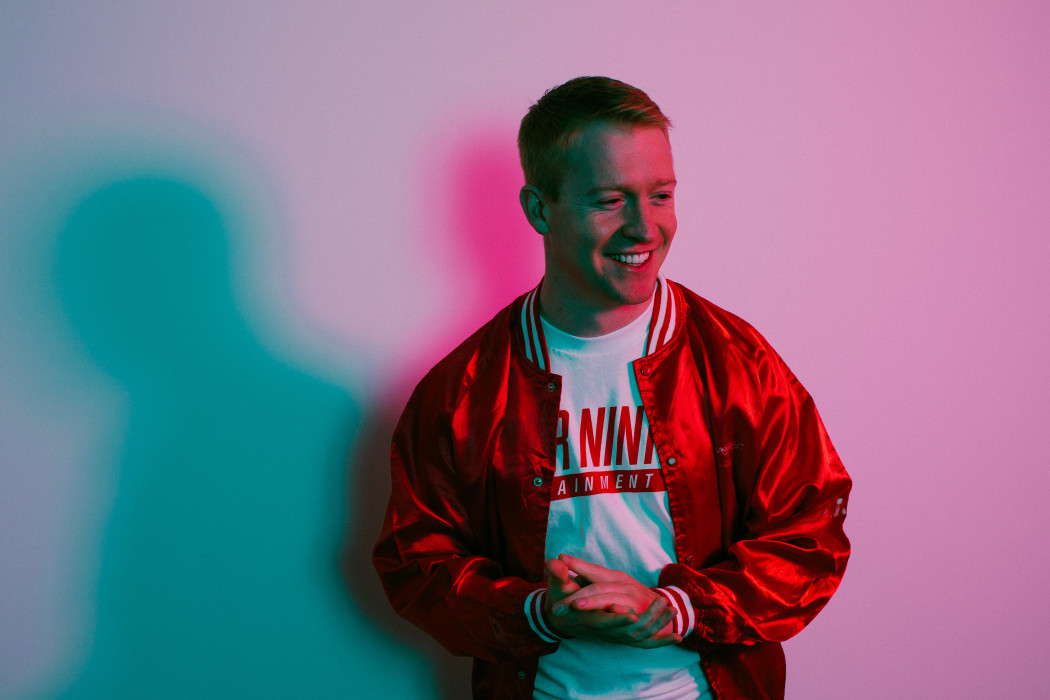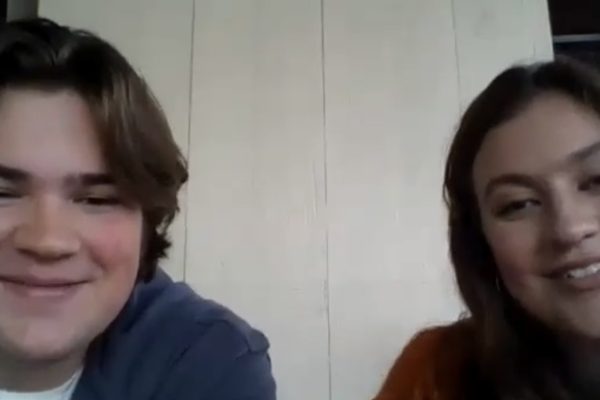Made up of Jack Mosbacher and James Small (drummer for Fantastic Negrito), Kezar–named after Kezar Stadium–is a music project that’s reflective of their home and hearts as artists coming up in the Bay Area (Oakland specifically for James and Fantastic Negrito). “I saw James on Jimmy Kimmel, actually. This has to be almost five years ago…” Jack recounts the origins of the collaboration. It was James captivating performance with Fantastic Negrito that sold him. “I tracked down his number through mutual friends, cold-called him, and said, ‘Hi. You don’t know me. But I really, really want to make music with you.’ Classic stalker tactics, really,” he jokes. “But he was nice enough to meet up. And the rest is history.”
It’s no secret that the Bay Area has a foot in impacting music, culture, and social consciousness. Green Day, the punk rock legends responsible for being at least two(?) generation’s angst and rebellious awakening, hails from there. Rapper and (Tony-Award winning) actor Daveed Diggs proudly reps the Bay including co-writing and starring in the movie Blindspotting with fellow native Rafael Casal. Prince protégé (and one of the best drummers to grace this Earth) Shelia E. also comes from there along with the likes of En Vogue, Kehlani, Zendaya, Third Eye Blind, Keyshia Cole, E-40…the list goes on. The point is, the Bay Area knows what they’re doing.
“We’re all a product of where we’re from and the people we sprouted up next to. The Bay Area happens to be where I was born–and I feel so fortunate that is the case,” Jack says. “It’s an incredibly vibrant and diverse place, full of so much beauty and so many contradictions. It’s a place where people dream big dreams, have a general intolerance for injustice, and are never satisfied.”
It’s a good segway then, to talk about Kezar’s latest single “Don’t Touch the Queen” which was made after a woman was harassed at a bar. “Of course, all of my songs are reflections of experiences I’ve shared or feelings I’ve had,” Jack says when he credits the song for being the first one he’s written about something he witnessed in real life, “But this was the first that was wholly based on something I’d witnessed.”
The title of the song, which also serves as the chorus/hook, was a quote from the woman at the bar who punched a guy that touched her inappropriately and told him, “No. Don’t touch the queen.” “I was spellbound by the power of that statement and the power of this woman,” Jack explains. “So much so that I went up to her immediately and asked if I could write a song about her. Thank goodness she said yes!”
While the song comes from and is inherently related to a serious issue that’s apparent in everyone’s lives, the disrespect and undermining of women in society which has seen a more mainstream (although not necessarily new) discussion in media sparked through the MeToo Movement, the song itself is essentially an upbeat pop anthem that fits within Jack’s ethos for Kezar to create music that brings light and joy. It’s also a demand–both through the song and through the music video. “I had worked with a wonderful director on my previous videos named Sarah Wilson Thacker and I noticed that she’d hired a mostly female crew. She told me that only 8% of film and video directors are women and that she’d never worked on or even heard of an all-female creative team,” he starts when I ask him about the concept of the video which features several women getting to exist in their own as themselves and sharing their stories.
Jack gave full creative control over the video, then, to the director with the promise that women would be put in key roles. “It was Sarah that came up with the concept and we worked together to find a diverse group of inspiring women that we felt stood for as many of the different traits of women that we both admire as possible.”
We’re all a product of where we’re from and the people we sprouted up next to. The Bay Area happens to be where I was born–and I feel so fortunate that is the case.
It’s not uncommon to find music that highlights the power and appreciation of women although it may not feel like it. If you ask just about every girl/woman what’s a song that empowers them without objectification or an oppressive gaze, we all have at least one. But, rarely is the song written and sang by men in a non-romanticizing way.
“My mother was an Olympic athlete, my sister was a college athlete, is my best friend, and an all-around badass. So even before you factor in any values or choices, believing in women was a lay-up for me from a young age. But I firmly believe that if you are coming from a place of privilege–for instance, if you are a straight white male in America–then you have two obligations: to listen to those whose voices have been silenced and to create platforms and avenues for those voices to be heard,” he says once I ask him about approaching a song like this as a man.
“This isn’t my story to tell–it’s a story that I’m called to help lift up. In this case, I’d written a song about my experience of being in the presence of one extraordinary woman when she did one extraordinary thing,” Jack continues, “Then I gave it to those whose larger story it really is to tell: women. And what they made with it is so far beyond what I ever could have myself.”
Discussing the responses he’s received from the video, Jack notes the naivety he can carry from the privileges he holds. “A lot of things that might seem obvious to others take me by complete surprise,” he admits. He gives the example of Kezar’s previous video, “(Tell Me) It’s Not Love” where his love interest was African American. “After the shoot, she took me aside and told me how touched she was that I had let her wear her natural hair. She told me she had never done a single project where she had been allowed to wear her hair like she normally does. I was genuinely and completely shocked, to the point of being confused.”
Jack disclaims that the thought hadn’t occurred in the first place to have her change her hair to begin with and as such, he also wasn’t aware of the significance that held until she told him. “The creative team and I just thought she was talented and beautiful exactly the way she wore her hair normally. That was such an eye-opening experience–that simply by letting people be themselves, you could be doing something good,” he reflects.
“The women that we featured in the ‘Don’t Touch the Queen’ video each expressed a similar sentiment: that they had never simply been celebrated for who they are.” Jack isn’t looking for a pat on the back or a ‘White Male Savior’ award when he points these things out. Instead, there’s a sense of him gaining awareness from these moments instead. “It’s simply that it was so easy to find things to celebrate about each of them that I couldn’t–and still can’t–imagine that they hadn’t been celebrated many times before. It was incredibly special and also incredibly eye-opening.”
“To be honest, hearing from these women was emotional. Their stories often broke my heart. But they also inspired me. The experiences shined a light on a lot of my own blind spots and showed me things that I want to do better as a man,” Jack says later when I ask him about if there was any song he’s made so far that’s challenged him in a way he wasn’t prepared for initially. “They reminded me of times I’ve fallen short of being the person that I want to be and they reaffirmed my resolve to be a listener and an advocate. I will be forever grateful and forever in awe of these women.”
[The women in ‘Don’t Touch the Queen’] reminded me of times I’ve fallen short of being the person that I want to be and they reaffirmed my resolve to be a listener and an advocate. I will be forever grateful and forever in awe of these women.
In terms of the production and creation of Kezar’s music, Jack goes back to his musical foundation of Motown. “I was obsessed with the great harmony groups like The Temptations and The Four Tops from a young age, probably starting around five-years-old. And those groups were all about light and joy. And the songs that bring those feelings most are the ones that I have the most visceral memories of,” he starts as we discuss the emotional power of music.
“I can vividly remember sitting on the floor in my childhood bedroom the first time I heard the slapping guitar intro to ‘My Girl’ or in my first car when I heard Hall & Oates sing, ‘You Make My Dreams Come True’ through the beat-up speakers,” he looks back.
With the creation of Kezar, Jack shared in an interview with Musical Notes Global that the sound they’re playing around with is a big leap music-wise that shows a new side of him highlighting his musical foundation. When I ask him about how he knew he was ready to move towards making this kind of music, he plays it to circumstance and chance.
“I’d signed with a new manager who dealt with electronic pop producers and introduced me to a few. I’ve always loved pop music, but my background is in bands. The music I’m making now is an entirely different palate and skill set that I just don’t have–all I know how to do is to gather a band of talented musicians with diverse backgrounds and lead it,” he says. “So, the songs and the sentiments are still very much true to who I am, but it’s like I was given a whole new set of paints and brushes to breathe those feelings into life.”
When discussing the process, Jack says it starts when he gets in a room with James, a producer, and a songwriter. “It’s incredibly organic: we come in, share some music that we are listening to, and talk about lyrical ideas as we start playing. It all comes together at the same time: the music, the lyrics, and production. It’s like building a house from scratch, without even any materials to start with. The emotions of the process are the same every time,” he explains.
“First, you start out terrified that you won’t come up with anything good. Second, you have an idea, and you’re convinced that it is going to be the Song of the Century. Third, as you’ve started making it, you decide that it’s the biggest piece of garbage ever created and question every choice you’ve ever made that led to being a musician and being in this room,” Jack goes through the whirlwind of emotions that hits.
“Then slowly, you finish it. And you realize that what you are doing is an incredible gift, that you can’t imagine doing anything else with your life and that it doesn’t matter whether it’s the song of the century or not,” he continues. “All that matters is that you are trying with everything you have inside of you to create something that outlives you and that has a chance of making someone’s life a little happier or a little better, even if only for a few fleeting moments.”
No man is an island. I wasted a lot of time thinking that I had to be one.
It makes sense then, that this collaborative process is also the thing that keeps him inspired as an artist. “So much of what we think of as ‘the artist’s process’ is either an extreme outlier or completely false–at least in my experience. I do not know a single pop artist who sits in a room by themselves from inception to completion. When I feel the urge to make something new, I call the most talented writers and producers I know–like Andrew Tinker, Jeoff Harris, Nitzan Kaikov, Ryon Baharloo, or Max Matluck–and simply find a time and a room. No man is an island. I wasted a lot of time thinking that I had to be one,” Jack shares.
As his biggest musical collaborator and the other half making up the heart and soul of Kezar, I ask Jack what it is about James’ artistry that has inspired him and how he thinks James would respond. “Everything about James inspires me. Not being falsely modest, I don’t know what I possibly have to offer him. He can play anything, and more importantly, he will play anything,” James praises the musician before suggesting, “I think what has inspired me most about James is how he has allowed me in.”
With Jack and James’ debut Kezar EP, made up of five tracks including “(Tell Me) It’s Not Love,” Jack is both appreciative and amazed by the final product. “I’ve completely let go of any expectation beyond those that I place on myself. I want to make music that I am proud of not just now but fifty years down the road. And I want to make music that is true to who I am and why I do this: to use my music to try to make people happy. Everything else is out of my hands.” He notes the gratifying feeling knowing that people are engaging with the work he’s releasing, but also won’t let it go to his head, “Where that gratification used to stroke my ego, now it’s simply knowing that my music is connecting with people all over the world and accomplishing that mission: to make their days a bit lighter and brighter.”
Upcoming, Kezar has plans to release a ton of new music including, Jack reveals, an acoustic album.
~~~
Jack’s Mini-Playlist for Readers [Listen Here]:
If You Don’t Know Me By Now – Harold Melvin & The Blue Notes
Laundry Room – The Avett Brothers
Sail On, Sailor – The Beach Boys
For Me, It’s You – Train
100 Bad Days – AJR
Everybody Lost Somebody – Bleachers
The Men That Drive Me Places – Ben Rector
I’ve Got a Need for You – David Ruffin
The Way We Move – Langhorne Slim & The Law
I’m Always Drunk In San Francisco – Carmen McRae
La Bohéme, Act I: “Che gelida manina” – Jonas Kaufmann
~~~
You can stay up to date on all things Kezar by following their Instagram, Website, Facebook, and Twitter accounts.
‘Don’t Touch the Queen’ is available wherever you stream music.
(photo cred: Catie Laffoon)




